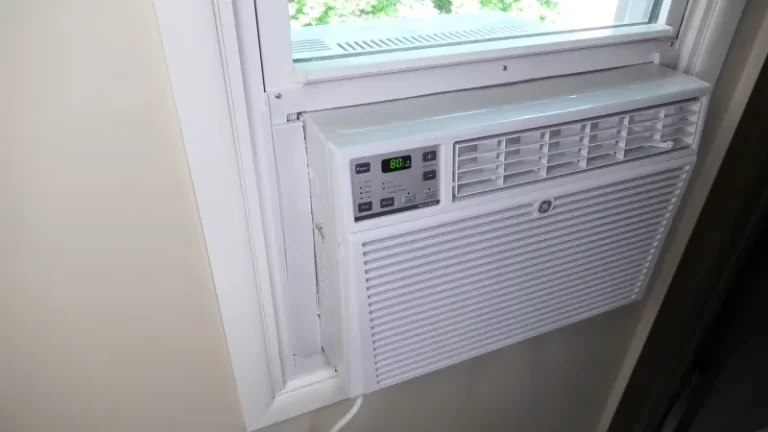Why Are Air Conditioners So Expensive?
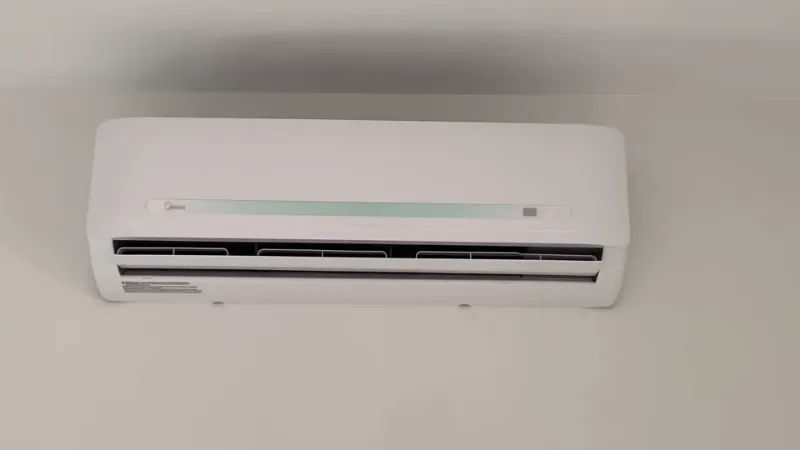
Air conditioners are a common household item and a great way to stay cool during the summer months. However, they can often be quite expensive. Depending on the size and type of air conditioner, prices can range from a few hundred dollars to thousands.
This begs the question: why are air conditioners so expensive?
In this article, we will explore the factors that contribute to the cost of air conditioners and why they are often so expensive.
You'll Learn About
Why Are Air Conditioners So Expensive?
The initial cost of an air conditioner can be expensive and depends on the size and type of AC unit. For example, window air conditioners are typically less expensive than central air conditioners. Central air conditioners also require additional installation costs, such as ductwork, which can add to the overall cost of the system.
The cost of air conditioners is influenced by a number of additional factors, including maintenance and repair costs, increasing demand, limited competition, intellectual property costs, and government subsidies and incentives. These factors can increase the cost of air conditioners for consumers, but also ensure that these units are reliable, energy-efficient, and meet the required standards.
Additionally, air conditioners with higher efficiency ratings tend to be more expensive.
Here are list of 20 reasons why Air Conditioners are So Expensive:
- Energy Efficiency Requirements
- Technology Advancements
- Increasing Raw Material Costs
- High Manufacturing Costs
- Research and Development Costs
- Brand Premiums
- Marketing and Advertising Costs
- Distribution and Supply Chain Costs
- Environmental and Safety Regulations
- Labor Costs
- Warranty and Maintenance Costs
- Shipping and Handling Costs
- Import and Tariff Fees
- Dealer Margins
- Energy and Utility Costs
- Maintenance and Repair Costs
- Increasing Demand
- Limited Competition
- Intellectual Property Costs
- Government Subsidies and Incentives.
Energy Efficiency Requirements
Air conditioners are becoming increasingly energy efficient due to government regulations and consumer demand for more environmentally friendly products. Energy efficiency requirements, such as the minimum Seasonal Energy Efficiency Ratio (SEER) ratings, have been established to minimize energy consumption and reduce greenhouse gas emissions. This has led to the development of new technologies and designs that increase energy efficiency, but also increase the cost of production.
Technology Advancements
Advances in technology have led to the development of new and improved air conditioning systems. These systems are designed to be more energy efficient, have better air filtration systems, and offer more features and functions than older models. This has resulted in an increase in the cost of air conditioners as these new technologies are more expensive to produce and often require specialized components.
Increasing Raw Material Costs
The cost of raw materials used in the production of air conditioners has been rising over the years. These raw materials, such as metals, plastics, and refrigerants, are subject to fluctuations in the global market, which affects their prices. The increase in raw material costs has been passed on to consumers in the form of higher prices for air conditioners.
High Manufacturing Costs
The cost of manufacturing air conditioners is high due to the complex and specialized processes involved in the production of these units. The high cost of manufacturing is due to the need for specialized equipment, trained workers, and strict quality control processes to ensure that the air conditioners meet the required standards. This has resulted in an increase in the cost of air conditioners for consumers.
Research and Development Costs
The cost of research and development for air conditioners is high due to the need for companies to invest in new technologies and designs to meet the changing needs of consumers. This involves significant investment in R&D to create new and improved products that meet energy efficiency standards, have better air filtration systems, and offer more features and functions. This investment has been passed on to consumers in the form of higher prices for air conditioners.
Brand Premiums
Air conditioners from well-known and established brands often command higher prices due to the premium associated with the brand name. Consumers are willing to pay more for air conditioners from well-known brands because of the perceived quality, reliability, and reputation of the brand. This has resulted in an increase in the cost of air conditioners for consumers who want to purchase units from well-known brands.
Marketing and Advertising Costs
Companies that produce air conditioners must invest significant resources in marketing and advertising to reach potential customers. This includes costs for advertising campaigns, trade shows, and promotional materials, which are passed on to consumers in the form of higher prices for air conditioners.
Distribution and Supply Chain Costs
The cost of distributing and supplying air conditioners is high due to the need for specialized transportation and storage equipment, as well as the costs associated with managing the supply chain. This includes costs for shipping, handling, and storage, which are passed on to consumers in the form of higher prices for air conditioners.
Environmental and Safety Regulations
Air conditioners must meet a number of environmental and safety regulations, such as those related to the use of refrigerants and the disposal of used units. Companies that produce air conditioners must invest in compliance with these regulations, which has resulted in an increase in the cost of air conditioners for consumers.
Labor Costs
The cost of labor involved in the production of air conditioners is high due to the need for specialized workers and the need for strict quality control processes. This includes costs for training, benefits, and wages, which are passed on to consumers in the form of higher prices for air conditioners.
Warranty and Maintenance Costs
Companies that produce air conditioners often offer warranties to ensure that their products are reliable and will perform as expected. These warranties come at a cost, which is passed on to consumers in the form of higher prices for air conditioners.
In addition, the cost of maintenance for air conditioners is also a factor that affects their price. This includes the cost of regular maintenance, repairs, and replacement parts, which are necessary to keep the units functioning properly.
Shipping and Handling Costs
The cost of shipping and handling air conditioners is high due to the size and weight of these units. This includes costs for shipping to retail locations, as well as the cost of handling and storage at these locations. These costs are passed on to consumers in the form of higher prices for air conditioners.
Import and Tariff Fees
Air conditioners that are imported into a country are subject to import and tariff fees, which are taxes imposed by the government on imported goods. These fees can increase the cost of air conditioners for consumers, as they are included in the price of the units.
Dealer Margins
Air conditioners are sold through a network of dealers and retailers, who often add their own margins to the price of the units. This includes costs for advertising, marketing, and sales support, which are passed on to consumers in the form of higher prices for air conditioners.
Energy and Utility Costs
The cost of energy and utilities used in the production of air conditioners is a factor that affects their price. This includes costs for electricity, natural gas, and water, which are necessary for the production process. These costs are passed on to consumers in the form of higher prices for air conditioners.
Maintenance and Repair Costs
Regular maintenance and repairs are necessary to keep air conditioners functioning properly and to extend their lifespan. This includes costs for routine check-ups, cleaning, and replacement parts, which can be significant over the life of the unit. Consumers who want to keep their air conditioners functioning properly must factor in the cost of maintenance and repairs when purchasing these units.
Increasing Demand
As the demand for air conditioners continues to increase, the cost of these units is also rising. This is due to the basic principles of supply and demand, as the price of air conditioners increases as demand for these units grows. This has resulted in an increase in the cost of air conditioners for consumers who need to purchase these units to stay cool in hot weather.
Limited Competition
In some markets, the competition among companies that produce air conditioners is limited, which can result in higher prices for these units. This is due to factors such as market saturation, brand loyalty, and the cost of entry for new companies, which can limit the number of competitors in a particular market. This can result in higher prices for air conditioners for consumers.
Intellectual Property Costs
Companies that produce air conditioners often invest significant resources in intellectual property, such as patents, trademarks, and copyrights, to protect their designs and technologies. These costs are passed on to consumers in the form of higher prices for air conditioners.
Government Subsidies and Incentives
Governments around the world often offer subsidies and incentives to companies that produce energy-efficient air conditioners. These subsidies and incentives can increase the cost of air conditioners for consumers, as they are included in the price of the units.
Installation Costs
Installing an air conditioner requires specialized tools and knowledge and is usually done by a qualified technician. Professional installation can cost several hundred dollars, depending on the size and complexity of the system.
Additionally, most AC units require additional components such as insulation, ductwork, and other materials, which can add to the overall cost. Two Stage might cost more.
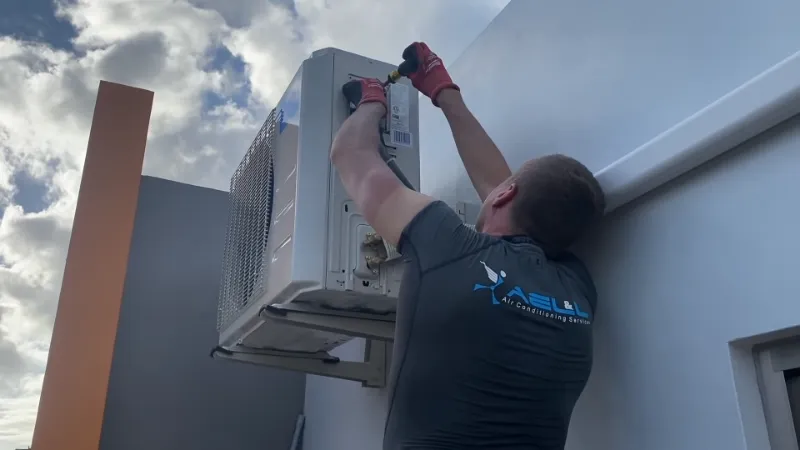
Maintenance
Air conditioners require regular maintenance to ensure that they are running efficiently and safely. This includes changing or cleaning filters, checking refrigerant levels, and checking for any mechanical issues.
These services can cost several hundred dollars each year and can add to the overall cost of owning an air conditioner.
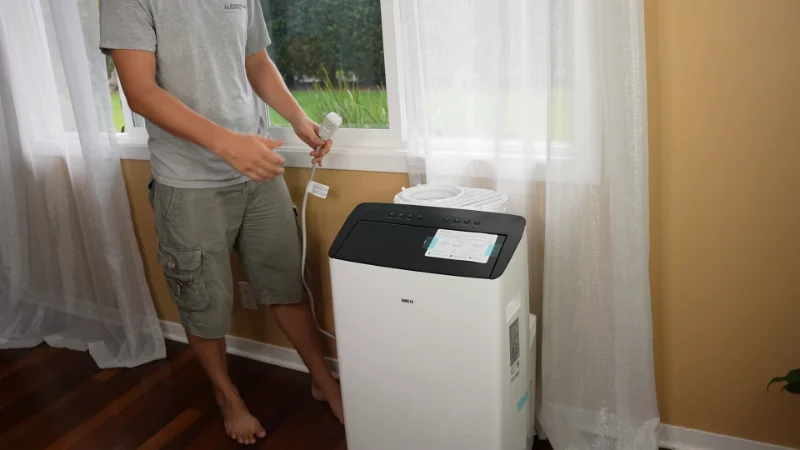
Energy Efficiency
Air conditioners with higher efficiency ratings tend to be more expensive than those with lower ratings. This is because they are designed to use less energy, which can help save money on utility bills in the long run.
Additionally, high-efficiency units tend to last longer than their less efficient counterparts.
Additional Features
Air conditioners with additional features such as smart thermostats, air purifiers, and remote access can also be more expensive. These features can help improve the comfort of your home and can also help save money on energy bills in the long run.
However, these features will add to the overall cost of the system.
In conclusion, air conditioners can be expensive due to the initial cost, installation costs, maintenance costs, energy efficiency, and additional features. While these costs may seem high initially, they can help save money in the long run by providing a comfortable home environment and reducing energy bills.
Does Air Conditioner Use a Lot of Electricity?
Air conditioners can be energy-intensive, depending on certain factors. Central air conditioners generally use between 3000 and 3500 watts per hour. Size of the unit, type of cooling system, insulation, and location all affect electricity usage.
Higher efficiency models use less energy and can save money in the long run. AC units with variable speed compressors or multi-speed fans are more efficient. Proper maintenance and regular filter changes can also help reduce energy usage.
Programmable thermostats can be used to adjust temperature settings and save energy. An AC unit set at 78 degrees Fahrenheit uses less energy than one set at 72 degrees. Sealing air leaks around windows and doors can increase AC efficiency.
Insulating attic and walls can reduce energy consumption and save money.
Is It Unhealthy to Not Have Ac?
Having air conditioning during hot summer days is essential for keeping our bodies and minds healthy. Not having air conditioning can cause our bodies to overheat, leading to dehydration, heat exhaustion, and heat stroke.
In addition, being in a hot environment can reduce mental alertness and make it harder to concentrate. Prolonged exposure to heat can also increase the risk of developing mental health problems such as depression, anxiety, and sleep disorders.
Not having air conditioning can also make it difficult to sleep at night, leading to fatigue and irritability during the day. It can also cause headaches and nausea, which can make it hard to focus on tasks or be productive.
Overheating can also increase stress hormones, leading to a decrease in cognitive performance. Spending too much time in a hot environment can also disrupt the body’s natural circadian rhythms, leading to insomnia or disrupted sleep.
It is important to stay cool during the summer months to prevent these health issues from occurring. Investing in an air conditioning system or visiting an air-conditioned place can help keep you cool and healthy.
What Percent of the World Has Ac?
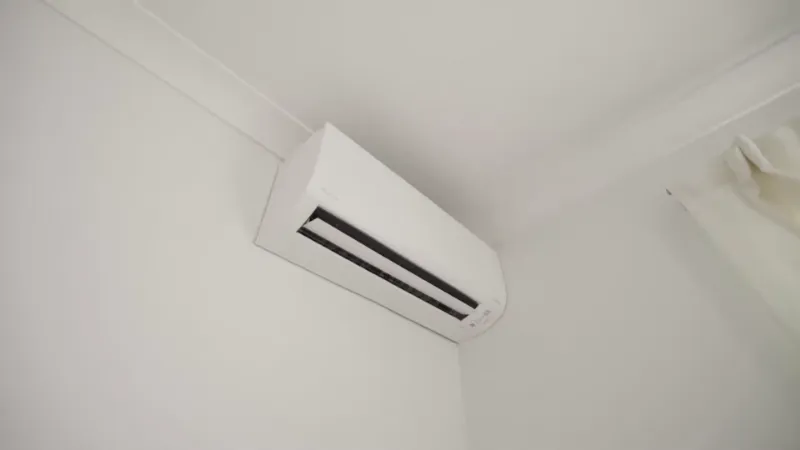
8% of the world’s population, amounting to 2.8 billion people, have air conditioning in their homes. This is particularly prominent in the world’s hottest and often poorest regions. A research team from the Harvard China Project recently published a paper on this issue.
The paper highlighted the unequal access to air conditioning across the world. The team found that many of the more developed countries have higher rates of AC ownership. Areas such as North America, Europe and some parts of Asia have the highest rates of AC ownership.
However, much of Africa, South America and parts of Asia still have low rates of AC ownership. This disparity in access to air conditioning can cause further issues such as health risks. Therefore, it is important for countries to invest in cooling solutions to ensure the health and safety of their citizens.
Governments should also set up initiatives to promote energy efficiency to reduce the environmental impact of AC usage.
Is It Ok to Leave Ac on All Night?
The short answer is yes, it is safe to leave your AC on all night. The main concern is the potential risk of fire or electrical shock, but this is unlikely as long as your AC is in good working condition and is regularly maintained.
Additionally, leaving your air conditioner on all night can actually help you sleep better, as the optimal temperature for sleeping is on the cooler end of the spectrum.
Benefits of Leaving Your Ac on All Night
Leaving your air conditioner on all night has several benefits. First, it can help you sleep better since the optimal temperature for sleeping is on the cooler end of the spectrum. Additionally, the constant circulation of cool air can help remove allergens and other irritants from the air, which can improve air quality and reduce allergy symptoms.
Lastly, leaving your AC on can help maintain a more constant temperature throughout the night, which can provide a more comfortable sleep environment.
Drawbacks of Leaving Your Ac on All Night
One potential drawback of leaving your AC on all night is the potential increase in your energy bill. Air conditioners can consume a lot of energy, so leaving it on all night can increase your energy costs.
Additionally, leaving your AC on all night can also cause the air inside your home to get too dry, which can lead to discomfort or even health problems.
Tips for Safely Leaving Your Ac on All Night
If you decide to leave your AC on all night, there are a few steps you can take to ensure it is safe. First, make sure your AC is in good working condition and regularly maintained. Additionally, you should make sure the temperature setting is set to a comfortable level and that the thermostat is properly insulated so it does not overheat.
Lastly, you should make sure your home is properly ventilated to ensure the air inside is not overly dry.
In conclusion, leaving your AC on all night is generally safe if your AC is in good working condition and is regularly maintained. Additionally, leaving your AC on all night can offer several benefits, such as helping you sleep better, reducing allergens and other irritants in the air, and maintaining a more constant temperature throughout the night.
However, it can also lead to an increase in your energy bill and cause the air inside your home to become too dry. Therefore, it is important to follow the tips outlined above to ensure your AC is safe to leave on all night.
How Many Hours Should Ac Run Per Day?
Air conditioning units should be run for 24 hours a day to keep your home cool. Running the air conditioner for 24 hours ensures your home stays at the desired temperature. Operating the AC for a full 24 hours a day is not wasteful; it’s designed to do so.
If you want to save energy, you should set the temperature to an appropriate level. Having your AC running 24/7 helps maintain a comfortable temperature in your home. It also helps keep humidity levels low, which is beneficial for your health.
You should also make sure to have your AC serviced regularly to ensure it is running efficiently. If you’re looking to save money, consider using a programmable thermostat to adjust the temperature when you’re not at home.
Additionally, you should make sure to replace the air filter regularly to ensure optimal performance. Running an air conditioner for 24 hours a day is the most efficient way to keep your home cool and comfortable.
Is It Cheaper to Run Ac at Night?
Running air conditioning at night can be cheaper than running it during the day. This is because the outdoor temperature is generally cooler at night, allowing the AC to run more efficiently. At night, air conditioners don’t have to work as hard to cool the same amount of air.
This means that the AC unit will draw less energy, saving you money on your electric bill. It’s also important to keep the thermostat set at a higher temperature during the day, so that the AC doesn’t have to work too hard.
You can also save money by using a programmable thermostat, which allows you to set different temperatures for different times of day. Keeping windows and doors closed during the day can also help maintain a cool temperature inside the house.
Additionally, using ceiling fans or other portable fans can help circulate cool air without needing to run the AC. Lastly, regularly replacing or cleaning air filters can help your AC unit run more efficiently, saving you money.
Overall, running an AC at night can be an effective way to save energy and money.
To Recap
In conclusion, air conditioners are expensive due to a combination of factors. The cost of the materials, labor, and technology involved in the manufacturing process all contribute to the overall cost of the unit.
Additionally, the demand for air conditioners has increased over time, making them more expensive. By understanding the reasons behind why air conditioners are so expensive, you can make an informed decision when it comes to purchasing one for yourself. Also, there are portable air conditioners.

